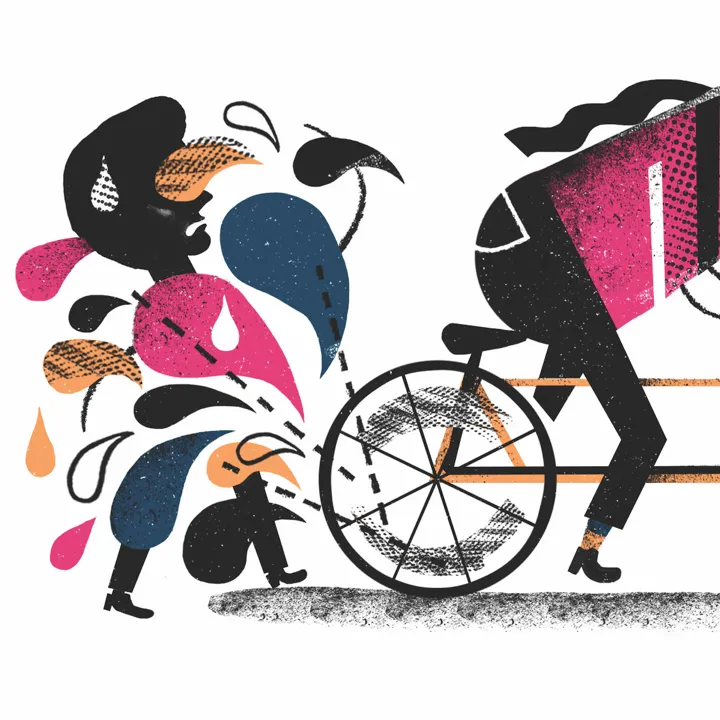Heart racing? Dreading the 9-5? If this feels familiar, then it’s time to take back control. Let’s find out how to beat stress before you burn out.
1
Take control
“Perceiving that we have control over what might happen is a very important way for us to be able to deal with demanding situations,” says Prof Marc Jones, a stress and emotions expert. “People often go into job interviews thinking they don’t know what they’re going to be asked, they don’t know what they’re going to say.
Instead, think: what can I control here? Focus on very simple things you can control like how you walk into the room, how confident you appear. It’s about building up our own resources to deal with stress differently.”
Research shows that this mental ‘reframing’ can genuinely help people’s performance under stress. Jones’s team at Staffordshire University found that the way a climbing task was verbally described to participants significantly changed how they approached the challenge: they did much better if it was made explicit that they had control of the situation.
2
Calculate the odds
There are other techniques we can use to help improve our mindset when we get stressed. For example, Frank Ghinassi, associate professor of psychiatry at the University of Pittsburgh, recommends everyday tips such as calculating probabilities of things actually going wrong instead of ‘catastrophising’.
If a worst-case scenario has a 1 in 10 chance of happening, then how much of your attention does it deserve?
3
Snack on fruit and nuts
Snacking on some fruit and nuts on stressy days may reduce stress and its damaging effects on the body. Recent tests have indicated that blueberries help counter the effects of PTSD in animals. And walnuts seem to prepare the body for stress, according to American researchers.
They found that adding walnuts or walnut oil to people’s diets reduced blood pressure responses to stress in the laboratory.
4
Jump on your bike
It’s boring but true: exercise reduces stress. This year, Canadian researchers reported that those who cycle to work display far lower levels of stress within the first 45 minutes of work than those who commute by car or public transport.
Other studies have indicated that how stressed you feel in the early morning affects stress levels throughout the day. According to the Mayo Clinic in the US, exercise relieves stress by pumping up endorphin levels and forcing the brain to focus on movement alone.

5
Get yourself a dog
Dogs are great motivators for going outside and getting some exercise. But their company can also be a stress buster – especially for children.
Children aged between 7 and 12 have been found to get much less stressed about arithmetic and public speaking tasks when they have their dog with them. Having a parent present did not have the same effect.
Another study shows that owning a pet reduces blood pressure.
6
Have a cup of tea
It’s the classic British response to a crisis: “Would you like a cup of tea?”. And there is some evidence suggesting it provides more than a psychological boost.
Research from University College London found that people who drink black tea become relaxed more quickly after a stressful task, and their cortisol levels return to normal at a faster rate.
There is still uncertainty about which tea ingredient accounts for this, but separate Portuguese research has indicated that the weak concentration of caffeine found in tea reduces anxiety symptoms in mice!
7
Walk in the woods
People who live in more natural environments tend to have lower levels of cortisol and fewer signs of chronic stress. Even if you live in the city, just getting out in the countryside can help.
Japanese research on Shinrin-yoku – meaning ‘forest bathing’ – has found that woodland environments lower cortisol, pulse rate and blood pressure. “It’s a pretty consistent finding that engaging with nature is a positive way to recover from stress,” says Jones.
8
Play video games
There is evidence that playing video games can help reduce stress, which flies in the face of those who blame all our ills on screens.
Cognitive psychologists at the University of Central Florida have shown that frazzled workers benefit more from playing a simple video game during a short work break than sitting in silence or taking part in guided relaxation.
This is backed by studies indicating that military veterans who regularly play computer games as a means of escape tended to have served longer and cope better with physical and psychological stressors.

9
Get hitched
Studies have found that stress gets worse if you’re lonely. Engaging with other people, particularly loved ones, buffers stress and helps you break out of a personal perspective.
For years, research has indicated that married people are healthier than single, divorced or widowed people, and now there’s evidence that this is directly related to lower stress levels. Research at Carnegie Mellon University, which was published in 2017, showed that married couples have consistently lower levels of the stress hormone cortisol.
But any form of engagement with other people may help: research shows that social isolation is strongly associated with increased blood pressure as well as higher cortisol levels.
10
Eat prebiotics
Prebiotics are compounds that promote the growth of good bacteria in the gut. Foods high in prebiotics include Jerusalem artichokes, chicory, garlic, leeks, onions, asparagus, bananas and whole wheat.
New animal research has indicated that eating prebiotics prolongs REM sleep, which is believed to be essential for recovery from stress and stress disorders. This links with other research indicating that keeping your diet healthy and your gut happy helps to buffer stress.
A recent study of 60,000 Australians, reported in the British Medical Journal Open, found that people who ate five to seven portions of fruit and veg daily had a 14 per cent lower risk of stress than those who ate zero to four.
- This is an extract from issue 319 ofBBC Focusmagazine. To read the rest of this article download theBBC Focusapp.Subscribeand get the latest issue delivered to your door.